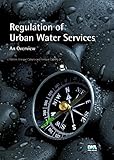Regulation of urban water services an overview Enrique Cabrera and Enrique Cabrera Jr. (editors)
Colaborador(es): Cabrera, Enrique [ed. lit.] | Cabrera Jr, Enrique [ed. lit.]
| Cabrera Jr, Enrique [ed. lit.] .
.
Tipo de material:  LibroEditor: London IWA 2017Edición: 1st publ.Descripción: XX, 196 p. 24 cm.Tipo de contenido: Texto (visual) Tipo de medio: sin mediación ISBN: 9781780408170.Tema(s): Agua
LibroEditor: London IWA 2017Edición: 1st publ.Descripción: XX, 196 p. 24 cm.Tipo de contenido: Texto (visual) Tipo de medio: sin mediación ISBN: 9781780408170.Tema(s): Agua| Tipo de ítem | Ubicación actual | Signatura | Estado | Fecha de vencimiento | Código de barras |
|---|---|---|---|---|---|
 Libro
Libro
|
Biblioteca y Centro de Documentación CNMC - Biblioteca de Competencia
Biblioteca especializada en Derecho de la Competencia, Derecho Mercantil y Economía Dirección C/ Barquillo, nº 5, 28004 Madrid
|
LIB-2264 (Navegar estantería) | Prestado | 06/08/2017 | 11029 |
Navegando Biblioteca y Centro de Documentación CNMC - Biblioteca de Competencia Estantes Cerrar el navegador de estanterías
Autores: Enrique Cabrera Jr. (Spain), Jaime Melo Baptista (Portugal), Michael Rouse (United Kingdom), Andrew Spears (Australia), Jens M. Prisum (Denmark), Andrei Jouravlev (Latin America), Wolf Merkel & Nicole Anntee Müller (Germany), Mathias Krause & María del Rosario Navia (Inter-American Development Bank, IDB), Enrique Cabrera (Spain), Féliz Parra (Aqualia, Spain)
Over the years urban water systems developed rapidly and unsystematically and today their implementation requires more control. They need to meet the demands of citizens for the 21st century in a sustainable manner providing good quality and at the lowest possible cost.
Urban water services represent a cornerstone of human civilization. They are fundamental for the wellbeing of the people living in an area and the economic growth in the region. Given their monopolistic nature, and increasing expectations placed on the quality, sustainability and affordability of those services, their regulation is necessary to meet the expectations of the citizens of the 21st century.
Regulation of Urban Water Services provides an overview of the regulation of urban water management throughout world and in Spain. To set the sector in order, the management of urban water systems requires a new tool to implement regulations that cover the varied concerns of high quality standards, growing complexity, social importance, the intrinsic monopolist nature of the sector and sustaining them environmentally, economically and socially. A series of case studies presented by international experts, aiming to identify best practices in regulation especially useful in those parts of the world where the regulatory model has not been fully designed or implemented. In order to provide water services meeting high quality standards, to face the growing complexity of the social and environmental constraints and to guarantee that those services will be economically, socially and environmentally sustainable; an effective form of regulation is necessary.








No hay comentarios para este ejemplar.